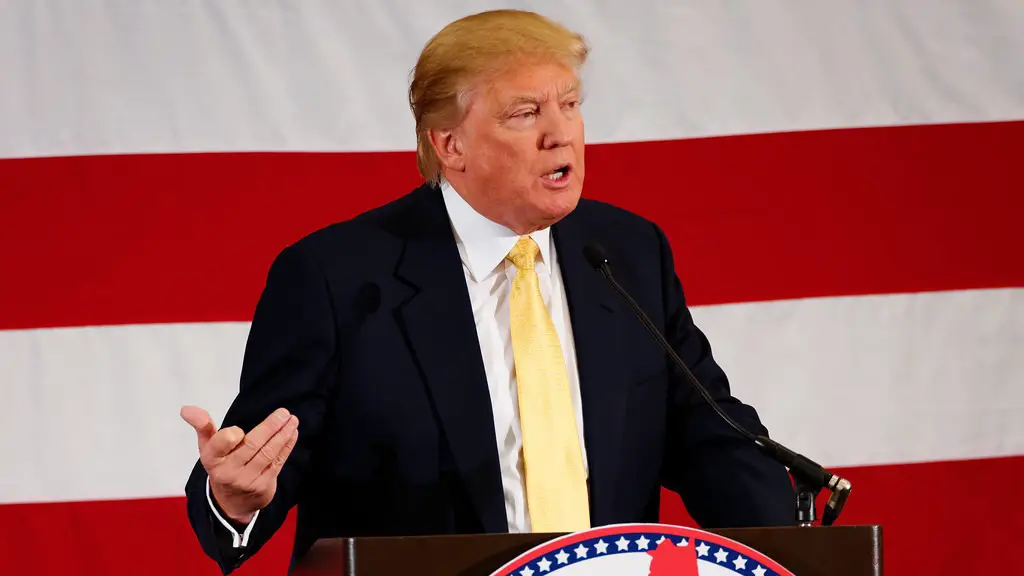There is much speculation as to whether or not Donald Trump, the President of the United States, has the ability to repudiate US debt. While some feel that he does have this power, others believe that he does not. in order to make a informed decision, it is important to understand the definition of “repudiate” and the process by which debt is normally repaid.
Donald Trump cannot repudiate U.S. debt.
Can US ever pay off national debt?
In modern history, the United States has never defaulted on its debt. The debt ceiling is the self-imposed limit on how much debt Congress allows the federal government to have. If Congress does not raise or suspend the debt ceiling, the United States could default on its debt, which would also impact financial markets and the economy.
The debt ceiling is the limit on how much money the US government can borrow. If the government exceeds this limit, it could trigger a deep recession. The effects of such an event would be negative for the economy and for ordinary Americans.
Who is backing the US debt
The public debt is the money that the US government owes to its creditors. The majority of this debt is owned by foreign governments, while the rest is held by US banks and investors, the Federal Reserve, state and local governments, mutual funds, pensions funds, insurance companies, and holders of savings. As of January 20231, the public debt totaled $2453 trillion. This debt is a burden on the US economy, and it is important to understand who owns it and why.
This accomplishment is a testament to president Andrew Jackson’s strong fiscal management and is an example to all future presidents. The national debt is a burden on taxpayers and it is imperative that it be managed responsibly. president Jackson’s example should be followed in order to keep the national debt manageable and reduce the burden on taxpayers.
What happens if US debt gets too high?
The national debt is the total amount of money that the US government owes to its creditors. The debt is held in the form of Treasury securities, which are issued by the US Treasury. The debt is constantly growing because the government spends more money than it takes in through taxes and other revenues. The debt is currently about $20 trillion.
The national debt has a number of impacts on the economy. First, it affects the budget and spending of the federal government. The government has to pay interest on the debt, which means that there is less money available for other programs. Second, the debt affects interest rates. When the debt is high, interest rates tend to be higher because investors are worried about the government’s ability to repay its debt. This can lead to higher costs for businesses and consumers. Third, the debt can impact consumer and business confidence. If the debt gets too high, people may lose faith in the economy and stop spending money. This can lead to a recession.
The United States’ debt situation is always in flux, depending on the state of the economy. In times of economic prosperity, the government collects more tax revenue and is able to make interest and principal payments on the bonds it has issued. However, during periods of recession, tax revenue decreases and the government has to sell more bonds to cover its expenses. As a result, the debt level goes up and down over time.
Can China call us debt?
Some key takeaways from this article on American debt and the Chinese yuan are as follows:
– American debt is considered a sound investment by both American retirees and Chinese banks.
– The Chinese yuan is tied to the US dollar, like the currencies of many other nations.
– Because of varying maturity dates, China would be unable to call in all its Treasury holdings at once in the event of a conflict.
In 2021, China owned $1095 trillion of the total $28 trillion US national debt. This is because the US has been borrowing money from China to finance its deficit spending. As a result, China now owns a large portion of the US debt. This is a problem because it means that the US is now indebted to China. The US may not be able to repay its debt to China, which could lead to a financial crisis.
Why is the U.S. in so much debt
The national debt is the sum of all outstanding debt owed by the federal government. It includes money owed to Social Security and Medicare trust funds, as well as other federal agencies, states, and localities. The debt also includes debt held by the public, which includes households, banks, insurance companies, and pension funds, as well as foreigners. The debt held by the public is also known as the national debt.
The debt has grown significantly in recent years, largely as a result of tax cuts, stimulus programs, and increased government spending. These factors have been compounded by decreases in tax revenue, due to widespread unemployment. As a result, the national debt has reached record levels, and is now larger than the size of the economy.
The debt is expected to continue to grow in the coming years, unless the government takes action to reduce spending and/or increase revenue. Failure to do so could lead to a fiscal crisis, in which the government would be unable to meet its financial obligations. This could have devastating consequences for the economy and the country.
According to data from the Japanese Ministry of Finance, as of November 2022, Japan held $108 trillion in Treasury securities. This is more than any other foreign holder of US debt. The low and negative yield market in Japan makes holding US debt attractive.
Who owns the US debt?
As of November 2022, the federal debt held by the public was $31 trillion. The debt held by the public was estimated at 9619% of GDP, and approximately 33% of this public debt was owned by foreigners. The large amount of debt held by the public and the high percentage of GDP that it represents is a cause for concern. The high level of debt held by foreigners is also a cause for concern, as it could lead to a loss of confidence in the US economy and a reduction in the value of the US dollar.
As of September 2019, foreign holders of United States treasury debt owned about $6.2 trillion, or about 29% of the total debt. The largest holders were China and Japan, who owned about $1.1 trillion and $1.0 trillion respectively. Other large holders included oil exporting countries and Caribbean banking centers.
How much debt did Reagan put the US in
Reagan’s policies led to a huge increase in the federal debt. This caused the US to become the world’s largest debtor nation. The debt increase was due to large government expenditures and tax cuts. Reagan’s policies were very unpopular with many people.
President Andrew Jackson is responsible for shrinking the US debt to zero in 1835. This is the only time in US history when the country was free of debt. Jackson’s fiscal responsibility is an example to follow for future generations of US leaders.
How can the U.S. get out of debt?
Politicians may be hesitant to raise taxes and cut spending in order to reduce debt, as this could lead to less spending on the military, which could in turn lead to job loss and a decrease in consumer spending. However, if spending is diverted from the military to other sectors, it could create new jobs and boost the economy.
The debt ceiling refers to the amount of money that the US government is allowed to borrow in order to finance its activities. The Congress sets this limit and it is usually increased when needed. In fall 1953, the US Treasury nearly hit the debt ceiling and the Senate refused to raise it until summer 1954. However, the federal government managed to avoid reaching the debt ceiling by using various measures, such as monetizing leftover gold. This led to a period of fiscal austerity and helped the government get its finances under control.
What country is in the most debt
Japan’s national debt is very high compared to other countries. The government has been trying to get the debt under control, but it has been difficult. The country’s economic situation has made it difficult to reduce the debt.
It is no secret that many states are struggling with high levels of debt. This is largely due to irresponsible spending habits or a decrease in income from taxes and other sources. However, there are a few states that have managed to keep their debt levels low. These states include Texas, Florida, Alaska, North Carolina, and Tennessee. These states have been able to stay relatively debt-free due to responsible financial management and strong economies.
Warp Up
No, Donald Trump cannot repudiate US debt.
In conclusion, Donald Trump cannot repudiate U.S. debt. U.S. debt is backed by the full faith and credit of the United States, and therefore, it cannot be repudiated. Trump could, however, refuse to pay certain debts, which would put the United States in default and have catastrophic consequences for the economy.





